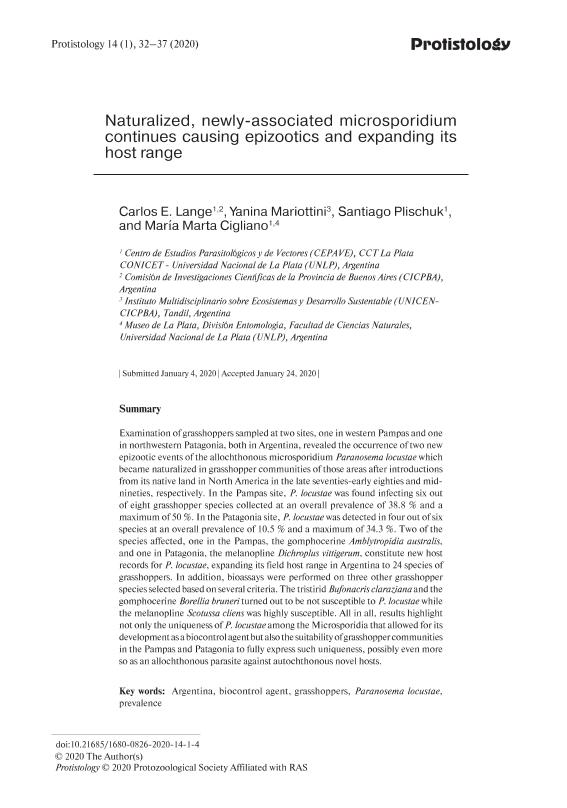Artículo
Naturalized, newly-associated microsporidium continues causing epizootics and expanding its host range
Fecha de publicación:
23/04/2020
Editorial:
Protozoological Society Affiliated with the Russian Academy of Sciences
Revista:
Protistology
ISSN:
1680-0826
Idioma:
Inglés
Tipo de recurso:
Artículo publicado
Clasificación temática:
Resumen
Examination of grasshoppers sampled at two sites, one in western Pampas and one in northwestern Patagonia, both in Argentina, revealed the occurrence of two new epizootic events of the allochthonous microsporidium Paranosema locustae which became naturalized in grasshopper communities of those areas after introductions from its native land in North America in the late seventies-early eighties and mid-nineties, respectively. In the Pampas site, P. locustae was found infecting six out of eight grasshopper species collected at an overall prevalence of 38.8 % and a maximum of 50 %. In the Patagonia site, P. locustae was detected in four out of six species at an overall prevalence of 10.5 % and a maximum of 34.3 %. Two of the species affected, one in the Pampas, the gomphocerine Amblytropidia australis, and one in Patagonia, the melanopline Dichroplus vittigerum, constitute new host records for P. locustae, expanding its field host range in Argentina to 24 species of grasshoppers. In addition, bioassays were performed on three other grasshopper species selected based on several criteria. The tristirid Bufonacris claraziana and the gomphocerine Borellia bruneri turned out to be not susceptible to P. locustae while the melanopline Scotussa cliens was highly susceptible. All in all, results highlight not only the uniqueness of P. locustae among the Microsporidia that allowed for its development as a biocontrol agent but also the suitability of grasshopper communities in the Pampas and Patagonia to fully express such uniqueness, possibly even more so as an allochthonous parasite against autochthonous novel hosts.
Palabras clave:
ARGENTINA
,
BIOCONTROL AGENT
,
GRASSHOPPERS
,
PARANOSEMA LOCUSTAE
,
PREVALENCE
Archivos asociados
Licencia
Identificadores
Colecciones
Articulos(CEPAVE)
Articulos de CENTRO DE EST.PARASITOL.Y DE VECTORES (I)
Articulos de CENTRO DE EST.PARASITOL.Y DE VECTORES (I)
Citación
Lange, Carlos Ernesto; Mariottini, Yanina; Plischuk, Santiago; Cigliano, Maria Marta; Naturalized, newly-associated microsporidium continues causing epizootics and expanding its host range; Protozoological Society Affiliated with the Russian Academy of Sciences; Protistology; 14; 1; 23-4-2020; 32-37
Compartir
Altmétricas




